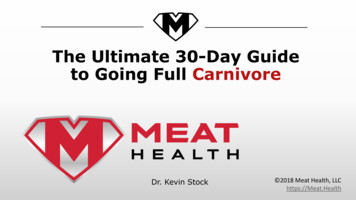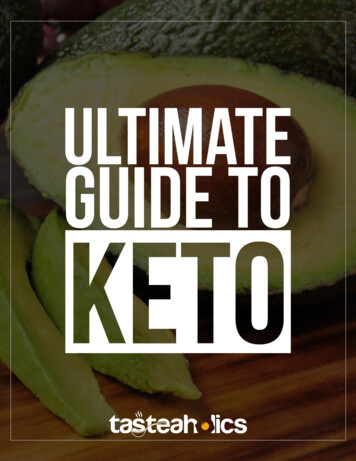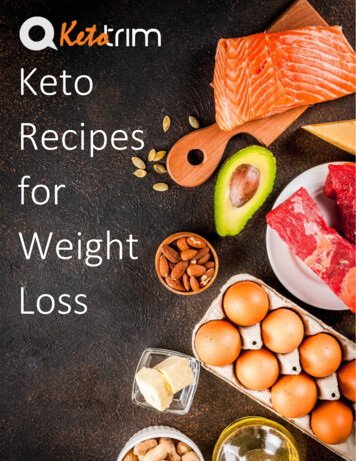
Transcription
Welcome!As someone interested in the world of keto, you've likely heard (or read) aboutit's amazing potential for weight loss, mental sharpness and more! A welldesigned ketogenic diet is a virtually unmatched tool for managing your weight(and many chronic health conditions) as well as supporting your cognitive acuityand overall healthy aging regimen.Notice, however, that I said well-designed ketogenic diet.With the exploding popularity of the keto diet, you'll undoubtedly find countlessapproaches and tips out there focusing only on increasing fat consumption oravoiding carbohydrates at any and all costs. These strategies, in my experience,miss the bigger picture of what keto should be—and what is possible with theketo diet.!What Is Keto?Keto is a loose term to describe a whole host of very low carb diets. Theunderlying commonality (and sometimes the only one) among many "keto"approaches is low carbohydrate intake. Within that definition, some suggest as
little as 10-20 grams of carbohydrates per day. Others, like the Keto Reset Diet,allow for 50 grams (and in some cases more).The key is to get carb intake low enough that the liver produces ketones (nowyou know where the name comes from), a source of energy that most of the body—including the brain— can use for fuel.Most of the time, particularly with the Standard American Diet, we're running ourbodies on glucose from the carb sources we regularly eat throughout the day.When carb intake is restricted enough, the body needs to tap other energysources. That can include fat and ketones. While much of the body can use fatefficiently, the brain does not—hence the need for ketone production under avery low carb scenario.Rather than understand this setup from a restrictive perspective, a look intohuman evolutionary history shows us this would've been a common if not defaultarrangement. Our hunter-gatherer ancestors didn't have regular access to muchcarb intake beyond seasonal fruits or tubers. They spent much of the timeoperating in ketosis—the metabolic state of producing ketones as a fuel source inthe context of carb restriction. Our bodies today fully retain this ability, and thereare substantial benefits from a lifestyle that incorporates that full metabolicflexibility.What Is the Keto Reset Diet?The Keto Reset Diet is a particular approach to keto that prioritizes nutrientdensity and natural, whole food eating. It's the approach I myself live (andpromote) because it's a sustainable means of achieving and maintaining ketosiswithout compromising overall nutrition or health.In other words, you get all the metabolic advantages of ketosis (lower insulinlevels, lower inflammation, more" even" energy and cognitive function, etc.) ANDthe critical benefits of a nutrient-dense diet. With the general suggestion of 50grams of carbs per day, the Keto Reset Diet offers a generous window to enjoy aflavorful, varied diet every single day.Watch the video below to learn more about the Keto Reset approach to ketogeniceating.An error occurred.
Try watching this video on www.youtube.com, or enable JavaScript if it isdisabled in your browser.Benefits of the Keto Reset DietThe ketogenic diet first emerged as a tool for clinicians to treat their patients withepilepsy. It was—and remains—the only thing with the consistent ability toprevent seizures.Cognitive Health!Keto's effects on neuronal function and health, along with the ability of aging ordegenerating brains to accept and utilize ketone bodies, also have implicationsfor other brain conditions, such as Parkinson's, Alzheimer's and even certainpsychiatric disorders.A ketogenic diet also appears to improve memory and cognition in those withminor declines in these area.Since ketosis can help with major brain disorders, many have wondered whetherit can improve cognitive function in otherwise healthy people. Although researchis still scant in that area, many people report a profound sense of mental clarityonce they've successfully transitioned to a keto diet. Unfortunately, researchershaven't studied the nootropic effects of ketogenic diets in healthy people—yet.They have looked at people with "milder" cognitive deficits, though, finding somepromising effects.
Metabolic DisorderThe ketogenic diet is increasingly used to treat metabolic disorder. Becausemaintaining a ketogenic diet reduces blood sugar levels, it's a natural strategy fortreating diabetes and even potentially reversing pre-diabetes. More research isunderway to illuminate the effectiveness of keto for those with metabolicdisorders.Cancer TreatmentIn cancer patients, a keto diet preserves lean mass and causes fat loss. Manyresearchers are exploring the use of ketogenic diets in preventing and treatingcancer, although results are very preliminary.Physical Performance!Being keto-adapted has several advantages for anyone interested in physicalperformance.It increases energy efficiency. It also spares glycogen. Glycogen is high-octanefuel for intense efforts. We store it in the muscles and liver, but only about 2400calories-worth—enough for a couple hours of intense activity at most. Once it'sgone, we have to carb up to replenish it. Keto-adaptation allows us to do morework using fat and ketones for fuel, thereby saving glycogen for when we reallyneed it. Since even the leanest among us carry tens of thousands of calories ofbody fat, our energy stores become virtually limitless on a ketogenic diet.
It also builds mitochondria. Mitochondria are the power plants of our cells,transforming incoming nutrients into ATP. The more mitochondria we have, themore energy we can utilize and extract from the food we eat—and the moreperformance we can wring out of our bodies. Ketosis places new demands onour mitochondria, who adapt to the new energy environment by increasing innumber.Fat LossAlthough keto is not a classical weight loss diet, it can certainly help a personlose body fat. After all, to generate ketones without eating ketogenic precursors,you have to liberate stored body fat.But that's not the main mechanism for ketogenic fat loss. Ketosis isn't "magic"—itdoesn't melt body fat away. Instead, it works for many of the same reasons astandard low-carb Primal way of eating works: by reducing insulin, increasingmobilization of stored body fat, and decreasing appetite.Many diets work in the short-term and fail in the long run. Weight loss isn't worthanything if you can't keep it off. Ketogenic diets appear to be good for long-termmaintenance of weight loss.What To Eat and Drink!The bulk of your food intake (in terms of volume) should come from "aboveground" vegetables—those that grow above the ground like greens, peppers,
broccoli, Brussels sprouts, cauliflower, tomatoes, celery, cucumber, kale,cabbage, asparagus, zucchini, mushrooms and avocado.You're also free to enjoy virtually any fish or meat that doesn't contain addedbreading or sweeteners. Eggs are also an ideal choice. In fact, many peopleoften don't eat enough protein while trying a keto diet. While an overabundanceof protein can inhibit ketosis, this isn't an issue most people would deal with. Theaverage American, particularly older men and women, don't eat enough proteinfor their muscle maintenance needs. Bone broth and collagen supplements thatdon't contain carb sources like sugars, fillers or binders are also healthy choiceswhile keto.The majority of your calories on a keto diet will come from fat. Choose healthysources like avocado, avocado oil, extra virgin olive oil, full-fat cheese, butter orcream, as well as fattier cuts of meat like "dark meat" poultry and fatty fish likesalmon.Nuts can be eaten in moderation, as they contain healthy fats and a minoramount of protein.For drinks, coffee and teas without sugar, unsweetened sparkling water andmineral water are ideal choices.What To AvoidIn short, you'll want to avoid empty carbs of all kinds. I like to look at healthy eating, andparticularly health keto, as the optimization of carb sources. Foods and drinks with a high carbcount and little nutrient value are obvious choices to avoid: sodas, juices, sweetened nut milks,candy, baked goods, and other sweets and grain-based foods.For the sake of maintaining ketosis, it's also important to avoid most legumes (like beans andpeas) and starchy vegetables (like potatoes, sweet potatoes and squashes) as well as dairy itemsof a higher carb count (like yogurts and milk).For more on what to eat and avoid, check out the Keto Food page and this Keto Shopping List.Tips For Getting StartedKetogenic dieting is a big jump for some people. You're literally switching over to a newmetabolic substrate. That can take some getting used to. Make sure you are well-prepared with aPrimal-aligned eating pattern in place for ideally several weeks before you ponder a journey intonutritional ketosis.
Make a minimum commitment to six weeks of nutritional ketosis. You'll want to allow ampletime for the transition to new fuel sources. Six weeks will put the metabolic machinery in placeand allow you to begin experiencing the most dramatic benefits of keto living.Get plenty of electrolytes. You'll want lots of sodium, magnesium, and potassium. Try 4.5grams sodium (about 2 teaspoons of fine salt or a little under 3 teaspoons of kosher salt), 300-400mg magnesium, and 1-2 grams of potassium each day on top of your normal food. Going ketoreally flushes out water weight, and tons of electrolytes leave with it.Eat extra fat during the first week to accelerate keto-adaptation. Just be sure to dial fatintake back after the first week or two.Do lots of low level aerobic activity. Walk, hike, jog, cycle, row. Keep things in the aerobic HRzone (under 180 minus age in heart beats per minute), and you'll increase your utilization of bodyfat, which will speed up ketone production and adaptation.Eat fiber. Many people on ketogenic diets tend to ignore fiber. That's a mistake. Fiber doesn'tdigest into glucose. It also supports your gut biome.Final Notes.Finally, it's important to share that, as with any new dietary regimen, it's important to consultyour doctor—particularly if you have an existing health condition.I don't recommend keto for women who are pregnant or nursing or for teens and young adultswho are still growing, unless directed and supervised by a physician. For more on ketoprecautions, check out this page.
You're also free to enjoy virtually any fish or meat that doesn't contain added breading or sweeteners. Eggs are also an ideal choice. In fact, many people often don't eat enough protein while trying a keto diet. While an overabundance of protein can inhibit keto










